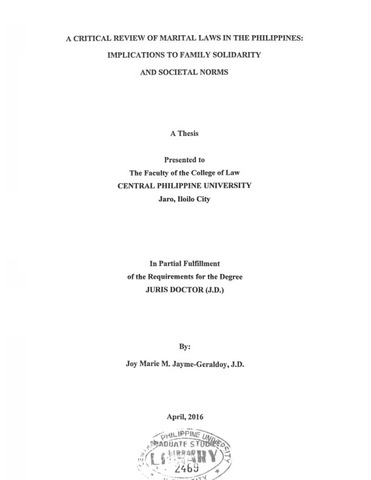A critical review of marital laws in the Philippines: Implications to family solidarity and societal norms
| dc.contributor.adviser | Alibogha, Salex E. | |
| dc.contributor.author | Jayme- Geraldoy, Joy Marie M. | |
| dc.date.accessioned | 2021-02-05T07:06:13Z | |
| dc.date.available | 2021-02-05T07:06:13Z | |
| dc.date.issued | 2016 | |
| dc.identifier.citation | Jayme-Geraldoy, J. M. M. (2016). A critical review of marital laws in the Philippines: Implications to family solidarity and societal norms (Unpublished postgraduate thesis). Central Philippine University, Jaro, Iloilo City. | en_US |
| dc.identifier.uri | https://hdl.handle.net/20.500.12852/187 | |
| dc.description | Abstract only | en_US |
| dc.description.abstract | This study was primarily conducted to analyze provisions of marital infidelity laws and how it affects family solidarity and the societal norms. The study employed neither survey nor sampling, and no population as well was considered taking into account the non-experimental nature and discursive type of this study. Findings, based on the discussion presented, showed that the discrepancy between the treatment of infidelity by the wife and the infidelity by the husband has been legally and judicially justified in US v. Mata as necessary to prevent “the danger of introducing spurious heirs into the family, whereby the rights of the real heirs may be impaired and a man may be charged with the maintenance of a family not his own.” Findings of the study likewise showed the current Philippine Penal Code has been more lenient to men and more demeaning to women. Women found guilty of infidelity receive longer prison sentences compared to unfaithful Filipino men. The current criminal laws in the Philippines on marital infidelity reinforce gender inequality and promote misogyny. In the final analysis, since concubinage is difficult to prove in court, it is better to file a case of psychological violence under R.A. 9262. Republic Act 9262 or the “Anti-Violence Against Women and their Children Act of 2004” has now come to the rescue of women. Philandering husbands can now be charged criminally even for just once incident of marital infidelity under the “psychological violence” provision of R.A. 9262. | en_US |
| dc.format.extent | ii, 67 leaves | en_US |
| dc.language.iso | en | en_US |
| dc.subject.ddc | GSL Theses 340.72 G311 | en_US |
| dc.subject.lcsh | Marriage law | en_US |
| dc.title | A critical review of marital laws in the Philippines: Implications to family solidarity and societal norms | en_US |
| dc.type | Thesis | en_US |
| dc.description.bibliographicalreferences | Includes bibliographical references | en_US |
| dc.contributor.department | College of Law | en_US |
| dc.description.degree | Juris Doctor | en_US |
| local.subject | Philippine Penal Code | en_US |
| local.subject | Anti-Violence Against Women and their Children Act of 2004 | en_US |
| local.subject | Marital infidelity | en_US |
| local.subject | Legal statute | en_US |
| local.subject | Psychological violence | en_US |
| local.subject | R.A. 9262 | en_US |
이 항목의 파일
This item appears in the following Collection(s)
-
Juris Doctor [144]


